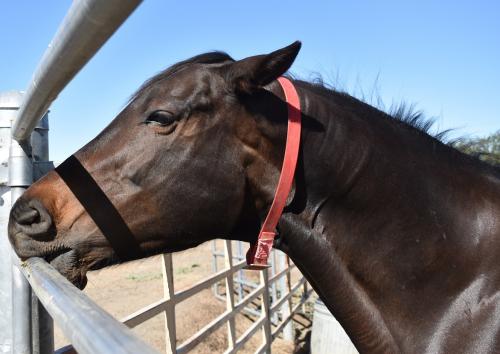Here We Go Again:
Cases of Recurrent Colic
Perhaps one of the only things worse than having a horse colic is having a horse colic again. Recurrent colic refers to repeated episodes of abdominal discomfort that occur over weeks to years, with at least 48 hours between episodes. Although common, recurrent colic can be frustrating as it is often challenging to diagnose the underlying cause since clinical signs are usually mild.
Research has shown that horses with a history of colic are at greater risk for further episodes than horses that have never colicked. Approximately one third of horses will colic again within one year of a colic episode. Some will colic multiple times.
Causes of Recurrent Colic

Unfortunately, there is a seemingly limitless list of causes for recurrent colic. It often occurs due to the continued presence of risk factors and individual predispositions. Some horses have sensitive intestinal tracts, are prone to “indigestion” or gas accumulation, or are predisposed to mild displacements. It is also important to consider underlying causes such as intestinal parasites, gastric ulcers, and intestinal abnormalities such as abdominal hernias.
We know that horses who have previously undergone colic surgery are at a greater risk for recurrent colic. This can be due to intestinal scarring and fibrous adhesions that can block feed material in the digestive tract, decreased blood flow (ischemia), intestinal trauma, or infection.
Aside from previous colic surgery and metabolic abnormalities, the most common reasons for repetitive colic are related to management. Risk factors for recurrent colic include stereotypies such as cribbing, wind sucking, or weaving, known dental problems, decreased time at pasture, previous abdominal surgery, and recent changes in diet. Other considerations include stress, sand accumulation, consumption of foreign objects, tumors, and enteroliths.
Management of Recurrent Colic
For cases with a clear, diagnosed cause, treatment is often straightforward. However, many cases are challenging to treat.
Management changes may be needed for horses that exhibit recurrent colic. Depending on underlying causes and known risk factors, these may include increased time in pasture, administering deworming treatments, and feeding complete feed/hay pellets.
Although nutrition may contribute to a predisposition to recurrent colic in some horses, evidence for nutritional strategies to prevent colic is limited. Supplements such as prebiotics, probiotics, mashes, and special diets have not been scientifically shown to prevent colic or reduce recurrence of colic episodes.
Covering the Cost of Colic
Treatment for colic can be expensive, and costs can accumulate quickly

. Insurance policies and colic coverage programs provided by dietary supplement companies are designed to ease the financial burden and provide owners with peace of mind. However, they are all slightly different, so it is important to know what is covered before you find yourself at the veterinary hospital.
The main distinction to keep in mind is medical versus surgical treatment for colic. It is important to note that most horses treated for colic do not go to surgery. Those that do, however, incur the highest costs.
The primary colic coverage offered by equine supplement companies only reimburses costs associated with surgery (up to $10,000 for one and $15,000 for another), not medical treatment. One company offers reimbursement for surgical or medical colic up to $10,000. These programs require regular qualifying orders of specific supplement products, which may be expensive, and have annual veterinary wellness requirements. They are easy to apply to and coverage is generally hard to lose once enrolled. However, it is important to be aware of limitations on coverage, lifetime benefits, and restrictions, especially for horses that have colicked previously. Benefits may be used on their own, or to augment existing insurance. Note that since these are reimbursement programs and paperwork is reviewed after treatment, it is not possible to know ahead of time if your claim will be approved.
Major medical and colic insurance policies may cover both surgical and medical colic. These policies can have deductibles, co-pays, annual premiums, and coverage limits. Age restrictions and other exclusions may apply. Insurance companies may deduct supplement program payments from their claim responsibility.
Whichever coverage you choose, have copies of your policies with you if you bring your horse in to the hospital to ensure the most accurate information so you can work with the clinicians to determine the best approach for your situation.
